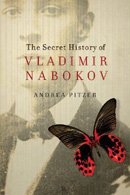The Boston Globe praises The Secret History
Kate Tuttle of The Boston Globe weighed in over the weekend with a generous review of The Secret History that ran in the March 17 print edition of the paper.
Noting Nabokov’s reputation as a “an almost impossibly gorgeous stylist, a linguistic virtuoso whose works glided past the wars, revolutions, and genocides that scarred 20th-century Europe,” Tuttle outlines the book’s argument that a return trip to reread Nabokov’s masterpieces reveals an author deeply engaged in portraying the tragic history of his era.
Pitzer takes readers on that trip, integrating Nabokov’s biography with a close reading of his works, asserting that amid some of the century’s most playful, glittering prose lurked the author’s “own private map, revealing the most profound losses of his life and the forgotten traumas of his age.”
…
Pitzer, like Nabokov, is a beautiful writer and gimlet-eyed observer, especially about her subject; even as an impoverished refugee living in America, she writes, “Nabokov was never shy about his sense of self.” Her attention to history’s moral components is refreshingly blunt: “The dead are not nameless,” she writes of the writers and others killed in Stalin’s Great Purge of the late 1930s. Inviting us to reconsider Nabokov, Pitzer also introduces herself as a writer worthy of attention.
Read the full review here, and more about Kate Tuttle here.
